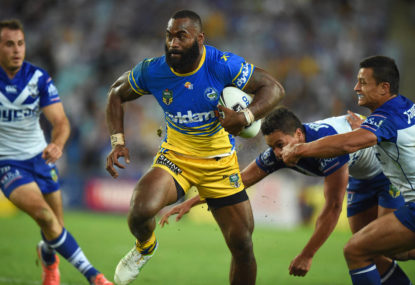On Saturday evening at Shark Park, every time Semi Radradra touched the ball or made a tackle, he was met with an unrelenting boo from the crowd.
Could it be because Semi has seemingly held the game to ransom over the last two weeks, following rumours he was looking to make a choice between rugby league and French rugby?
Could it be because he is an explosive player and fans just wanted to put him off his game?
Or could it be a reaction to the news that Semi has been charged with three domestic violence offences by police in relation to his former partner?
When the charges against Radradra were announced last week, my first question was should he take the field against the Sharks.
After much thinking, my view is no.
The rugby league community in Australia is a family and it includes all of us, from those involved in the grassroots, to the fans, all the way to the administration at Rugby League Central. All people need to feel welcome and included.
I’ve written before about how, despite what is often reported in the media, rugby league is a sport where women are made to feel welcome.
But the reality is, sport reflects society, one in which domestic and family violence are prevalent issues. Despite the work the NRL does with organisations like White Ribbon, the Full Stop Foundation, and the work of specific clubs – like the Parramatta Eels, which was the first Australian sporting club to launch a Domestic Violence Action Plan, or the Canterbury Bulldogs, who also made history when they partnered with White Ribbon – these issues are not going away.
I would like to see the NRL and the clubs take a consistent stance when it comes to players who have been charged with offences (not just offences which involve acts of violence), and have that consistent stance be that the player is stood down until the charges have been resolved.
It needs to be made clear that standing a player down does not make an assumption about their guilt or their innocence – each person is innocent until proven guilty. That player should still be paid, should still be able to train with the team, and be part of his playing group.
But he should not take the field.
This sends a strong message that the charges are being taken seriously, and takes the power away from the clubs. The process is clear and it is the same for each player. It does not depend on the player’s talent, whether the team has the opportunity to play finals football, or how much money the relevant player is being paid. It is black and white.
The harder question comes next.
Should a player be convicted of an offence and then meet their obligations under the law, should they be able to return to our game?
Whenever I ask this question, I am often met with a resounding no.
If we follow that view through, the position becomes that ‘any player charged with an act of violence against a woman should not be allowed to play our game’.
I really struggle with this.
Firstly, a number of players in our game have been convicted of offences and used the second chance that rugby league has given them to change their lives, or to make a positive impact in the community. Men that immediately come to mind are Danny Wicks and Manu Ma’u, both at the Parramatta Eels, who have taken the opportunity given to them by the club with two hands.
If the position set out above is taken, why should these men be allowed back in the game and others not? What sort of offence is serious enough to deem a player never allowed to return, and who makes that call?
Perhaps this is where it comes down to each club, the individual player, and the message that the club would like to send to the community.
I can contemplate a situation where a player makes a mistake, is convicted, meets their obligations under the law and is allowed to play NRL again, but is then used as an example to demonstrate that violence, towards anyone, is simply not tolerated in our game.
This can happen through training, demonstrating remorse and developing a genuine understanding of the affect violence has.
Other players may not be capable of such a change. These players should not be welcome in our game and nor should players who are repeat offenders.
The key, however, is consistency.
If the NRL wants to continue to be respected as a sporting code that takes violence towards women seriously, then a process must be developed to deal with these situations so that the general public is not left wondering, “How will the player will be dealt with this time?”
Despite these incidents happening in all sports, they are more often associated with rugby league, and these negative headlines do drive away some people from engaging in our game.
It’s time for the NRL and our clubs to take a consistent stance and absolutely demonstrate that violence towards anyone, whether it be a man or a woman, will not be tolerated.
This is @mary__kaye from @ladieswholeague





























































































